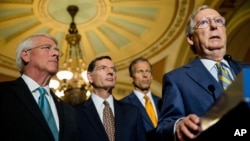President Barack Obama on Tuesday signed a bill to reform and restart the bulk collection of Americans’ telephone records, a program that expired earlier this week.
The president said the USA Freedom Act "protects civil liberties and our national security."
The legislation mandates that private telecommunications companies, rather than the National Security Agency, will collect and retain phone records nationwide. Federal authorities will need a court order to review those records and look for points of contact with known or suspected terrorists abroad.
Earlier Tuesday, the Senate voted 67-32 to approve the measure and send it to Obama, after days of intense and heartfelt debate about protecting national security and safeguarding civil liberties
The bill enjoyed strong Democratic support but divided majority Republicans, some of whom wanted to resurrect the once-secret government program exposed by fugitive former NSA contractor Edward Snowden.
Republican Senate Majority Leader Mitch McConnell of Kentucky warned of a less secure America, calling the vote “a resounding victory for those who currently plot against our homeland.”
“It surely undermines Americans’ security by taking one more tool from our war-fighters, in my view, at exactly the wrong time,” McConnell added.
'Truly perplexed'
Senator Susan Collins, a Maine Republican, also opposed the bill.
“I am truly perplexed that anyone would argue that telephone data are better protected in the hands of 1,400 telecom companies and 160 wireless carriers than in a secure NSA database that only 34 carefully vetted and trained federal employees are allowed to query under the supervision of a federal judge,” she said. "The [new] system is going to be less effective, because there is absolutely no guarantee that this data will be retained by the telecom companies and the wireless carriers."
But Democratic Senator Patrick Leahy of Vermont, who helped write the bill, called the measure "a step forward, because ultimately we protect the privacy of individuals.”
“This bill recognizes that our privacy is not — and ought not ever be — deemed to be in conflict with our security. Our privacy is, in fact, part of our security,” said Republican Senator Mike Lee of Utah, a co-author of the legislation.
The nation’s telecommunications industry has been publicly silent on the bill. Contacted by VOA, America’s third-largest phone company, Sprint, declined to comment on the legislation.
Former U.S. intelligence officials say data collection constitutes an important arrow in America’s national security quiver — one that will be affected by the USA Freedom Act.
“The fact that it would take place in a telephone company, rather than at NSA, means that the government effectively has no control,” former CIA Director James Woolsey said in a VOA interview. “That in turn means that if the telephone company decides it is too much trouble and only decides to keep track of the metadata for one month, two months, but after that they’re going to throw it away, then the government loses the ability to use that metadata as a way of finding patterns and being able to get a warrant and then be able to look into the inside of the communication.”
Voting by conscience
To get to a final vote, the Senate had to overcome a procedural blocking maneuver by Republican Rand Paul of Kentucky, who objected to bulk collection of phone records by any entity — corporate or governmental — as an unconstitutional violation of Americans’ privacy.
The Senate also voted down several amendments put forward by the chamber’s Republican leadership to give the new system additional startup time and provide assurances that, once in place, it works as intended.
Any changes could have torpedoed the bill. The House of Representatives overwhelmingly approved the USA Freedom Act last month, and key members warned that an amended bill would not have passed the chamber.
The Senate initially tried and failed to address the government’s expiring snooping capabilities the week before last. Some bemoaned that the chamber had waited so long to act.
“We have known about this particular deadline for four years," Lee said. "For four years, we knew that these provisions were going to expire. We should have taken these provisions up far before now. The American people deserve better than this.”
While much legislation taken up by Congress invites lockstep partisanship, senators made clear on this matter that they were voting based on their individual judgment and conscience. For some, like Republican James Inhofe of Oklahoma, national security was the pre-eminent concern.
“Let’s think about this, take a deep breath, go ahead and pass something so at least we have some capability to stop these [terrorist] attacks and gather information,” Inhofe said.
For others, civil liberty concerns were paramount.
“We need to strike a balance that protects very precious constitutional rights and liberties,” said Democrat Richard Blumenthal of Connecticut. “After all, what does our surveillance and intelligence system protect if not these fundamental values and rights of privacy, and liberties that have lasted and served us well?”
Watch video report from VOA's Zlatica Hoke:






